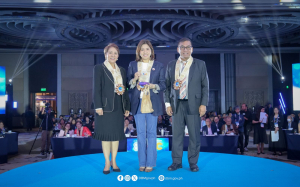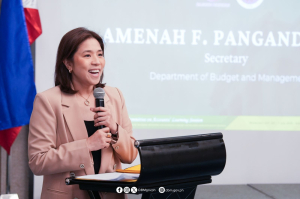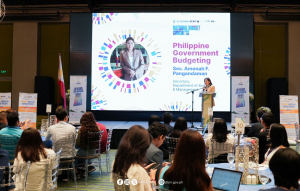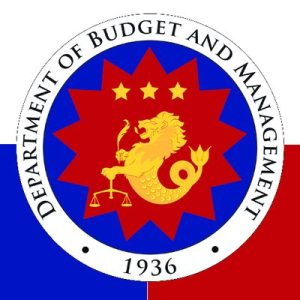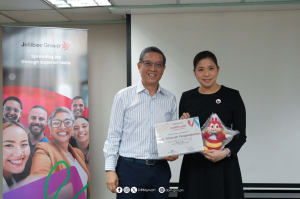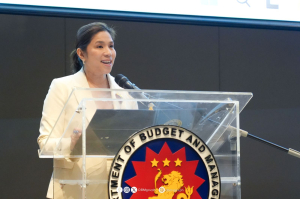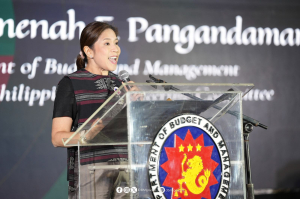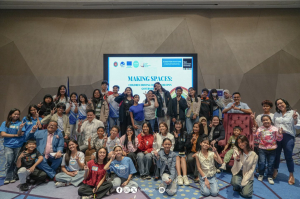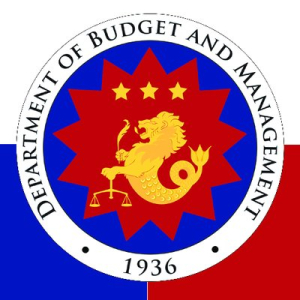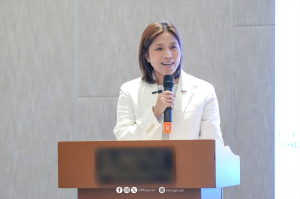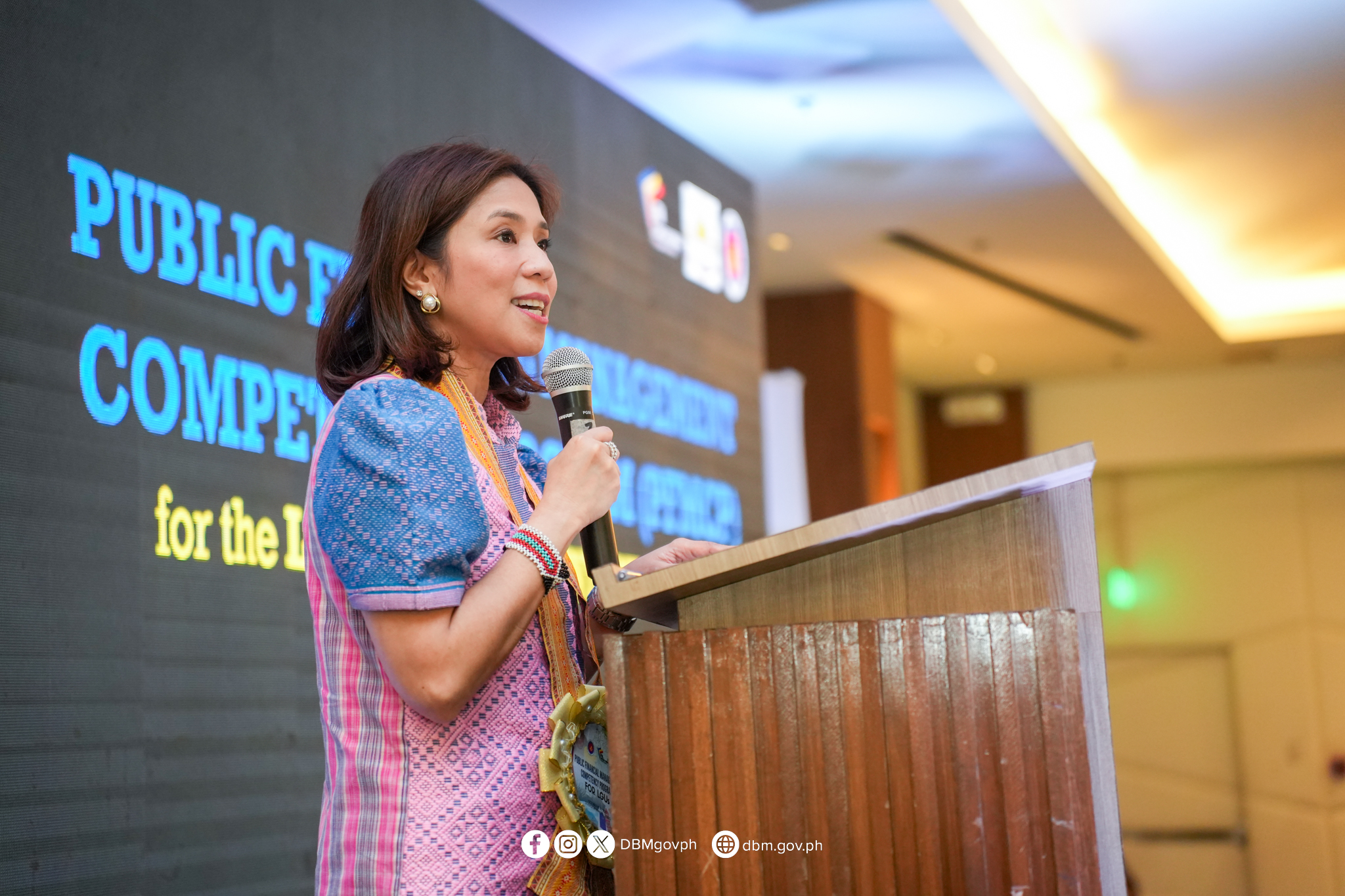
- Details
Public Financial Management Competency Program for Local Government Units
Diversion 21 Hotel, Iloilo City

To the Local Government of Iloilo, represented by Provincial Administrator Dr. Raul Banias—maraming salamat po sa mainit na pagtanggap sa amin sa Department of Budget and Management;
To the Association of Local Budget Officers in Region VI (ALBO VI), Inc. headed by President Arlene C. Depakakibo;
To my DBM colleagues, most especially to DBM-Regional Office VI led by our Acting Regional Director Maria Liane Gayomali whose support has been invaluable to the success of this activity;
To our local budget officers and Public Financial Management (PFM) practitioners; and all our participants, maayong adlaw po.
Assalamu alaikum wa Raḥmatullahi wa Barakatuh.
First, please allow me to congratulate all of you for being part of this year’s Public Financial Management Competency Program (PFMCP) for Local Government Units (LGUs). Napakasaya po namin sa DBM na umabot na dito sa Visayas, lalong lalo na dito sa Iloilo ang ating PFM capacity development program. And I am delighted to personally see that we have a lot of participants joining us in this run.
We specifically designed this training program for LGUs to deepen your knowledge on PFM. As we all know, our end goal is to promote good governance, financial accountability, and effective resource management in your respective localities.
Hence, I would like to sincerely thank all of you for taking the time to participate in this PFMCP despite your busy schedules. I admire and commend your effort to improve yourselves through this program, your dedication to providing better quality public service, and your commitment to serving the people.
I have conversed with various PFM practitioners across the country, so I am aware of the many challenging situations and circumstances that you face at the local level. As such, it is through these conversations with LGUs, as well, that I was made aware of your request to have a targeted and LGU-focused PFM Competency Program. And this is the very reason why we worked hard to implement this together with PHILLBO.
In addition, this event is much more special because we will also be turning over the Internal Audit Manual (IAM) for Local Government Units, 2023 Edition. We hope that this version of the IAM will help you establish and operationalize your respective internal audit services or units and strengthen the same so that your LGUs will reap the benefits of an effectively functioning internal audit.
In the next three days, you will be given updates and information under the Foundation, Budgeting, and Procurement Tracks by our credible resource persons.
I cannot emphasize enough the importance of procurement in governance. Kanina po, sinabi ng ating administrator na parang meron po tayong underspending. Hindi lang po ‘yan dito sa mga LGUs; that’s also true for the national government. Sabi sa recent report, bumaba po to 5.3% ang ating GDP growth. Isa po sa nag-contribute sa pagbaba ng growth natin ay ang government sector. Hindi po natin nagastos ang ating mga budget. Kaya kung kayo po ay may catch-up plan, ang national government po, nagkaroon din po ng catch-up plan. Lahat po ng departments and agencies, pinag-submit po natin sila ng kani-kanilang catch-up plans. Kasi hindi po ba, ang budget, kaya po natin ‘yan ginagawa para maibigay natin nang mas efficient, mas mabilis, sa ating mga pinaglilingkuran?
Isa po sa mga nakita natin na bottle-necks ay ang government procurement. Mahirap po ba ang procurement? Tama po kayo. During the SONA of the President, he asked the Congress na mag-enact ng amendments to our Government Procurement Reform Act. So binilisan po ng DBM, kasama po ang ating mga stakeholders, GPPB, at PS-DBM, ang pag-amend ng ating Government Procurement Reform Act.
Alam ninyo po, 20 years na po ang GPRA. I was just starting in national government noong binuo ang GPRA. Staff po ako ni Senator Angara during that time. Kami po ‘yung nagsimula ng GPRA. Naalala ko po noong pagkapasa ng Procurement Law—that’s the very first law on procurement—si Senator po, pumupunta po ‘yan sa iba’t ibang lugar ng mundo and he’s presenting our Procurement Law kasi it is one of the best procurement laws that we had during that time. Again, maganda pa rin po until now, kaso lang po marami nang changes ang nangyari sa atin—may use of technology, digitalization, modern na po ang era natin.
I’d like to think also that our budget officers, planning officers, and our government employees are well developed and equipped sa procurement. Hindi na po kailangang isa-isahin lahat, tapos mayroon pang checklists—napaka-tedious po ng process.
With that, we presented to the Legislative-Executive Development Advisory Council (LEDAC) noong September 20 ang ating procurement amendments at inapprove po ito ng LEDAC. Nandoon po ang Senate at House of Representatives and it was included in the Common Legislative Agenda (CLA) and we are also happy to note that the House of Representatives, nag-hearing na po sila dito many times. We are hoping po na maipasa na ng Mababang Kapulungan ang amendment sa Procurement Law. And just yesterday, nag-hearing na po ang Senate of the Philippines para sa amendments sa Procurement Law at ang nakakatuwa po, ang nag-introduce ng amendments ay ang anak ni Senator Angara, si Senator Sonny Angara—I’m sure kilala niyo po siya.
These amendments include various strategies in procurement planning including market scoping, early procurement activities, and the use of framework agreements. We will likewise leverage digitalization and innovation to make public procurement more efficient and transparent through the modernized Philippine Government Electronic Procurement System (mPhilGEPS).
If all goes well, we will soon also have an electronic reverse auction and an electronic or e-marketplace which we will expand to not just common-use supplies but also non-common-use supplies. This is similar to Shopee and Lazada; hence, it will be easier for us to order office-use supplies.
We will also make our procurement systems green! We will adopt a Green Public Procurement Strategy in the procurement of goods, infrastructure projects, and consulting services to ensure reduced environmental impact throughout their life cycle. In addition, we aim to integrate green practices and environmentally relevant criteria in the procurement design of a project, and effectively establish a local market for green products.
Most of all, because DBM is the head of the Open Government Steering Committee in the Philippines, we will make procurement transparent by mainstreaming public participation in our procurement process. We will be inviting at least two observers—from the private sector and the civil society—to sit in our procurement proceedings. And, if I may share, before going here, I was also with the OGPinas! Visayas Leg, together with our partners from Civil Society Organizations, the Department of the Interior and Local Government, and the Philippine Information Agency.
Now on the budget, I am proud to share that the House of Representatives approved the Fiscal Year 2024 General Appropriations Bill on third and final reading last September 27—wherein a total of Php 1.008 trillion or 17.5 percent will be allocated to the Local Government Units. And this feat would not be possible without your support, our dear budget officers, as you play a crucial role in bringing the needs of our fellow Filipinos to the national government, making our PFM system responsive and people-oriented.
Thus, we remain committed to continuing and even upscaling our efforts to provide you with more capacity-building and assistance in the future, as we update our PFM policies and guidelines to cope with the changing times and the evolving needs of our people.
Through our capacity building, I hope that you will be inspired not only to work harder but also to help us implement the necessary reforms that will improve our government systems and processes.
I also hope that this PFM Competency Program will help you create and execute the necessary Programs, Activities, and Projects that will make your respective LGUs thrive because ultimately, that is the wisdom of the Mandanas-Garcia Supreme Court Ruling: to empower our LGUs to serve the people in your localities faster and better.
Sama sama po nating paigtingin at pagitingin ang ating mga LGU sa pamamagitan ng wasto at tapat na pagsasagawa at paggamit ng ating mga budget tungo sa Bagong Pilipinas. Together, let us secure a future-proof and sustainable economy and achieve our Agenda for Prosperity.
Mabuhay po ang Region VI! Mabuhay po ang Iloilo! Mabuhay ang Pilipino at ang Bagong Pilipinas.
Maraming salamat po.
Wabillahi Tawfiq Wal Hidaya, Wasalamu alaikum wa rahmatullahi wa Barakatuhu.
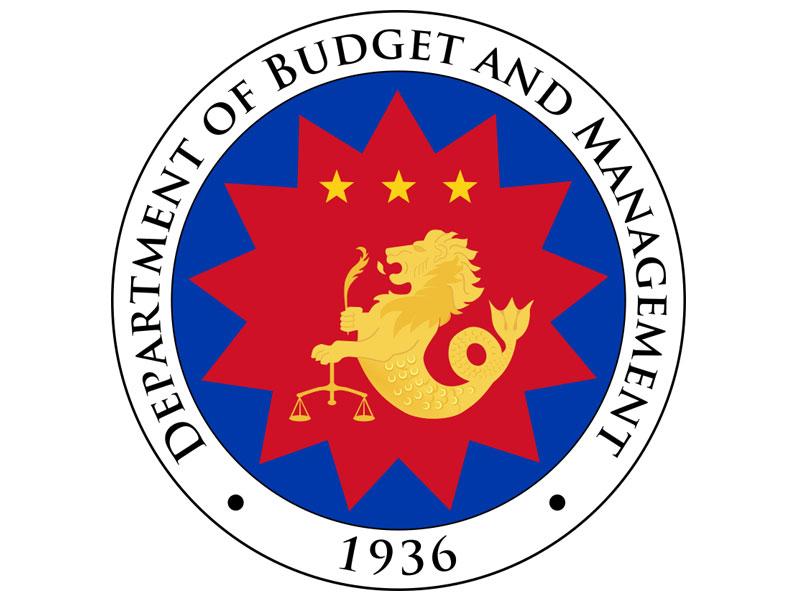
- Details
RECORDED MESSAGE
Internal Auditing Week in the Housing Sector
October 16, 2023
A pleasant day to the officials and employees of the Department of Human Settlements and Urban Development (DHSUD) and its key shelter agencies, namely:
- The Human Settlements Adjudication Commission (HSAC);
- National Housing Authority (NHA);
- Social Housing Finance Corporation (SHFC);
- National Home Mortgage Finance Corporation (NHMFC); and
- Home Development Mutual Fund (HDMF).
I am honored to deliver this message, albeit virtually, for the kick-off event of the DHSUD Internal Auditing Week. Before I proceed, I would like to offer my most heartfelt congratulations to you on the success of your recently concluded Philippine Urban Forum.
The Department of Budget and Management (DBM) is one with your esteemed agencies in recognizing the pivotal role of internal audit in the housing sector. We strongly believe that internal control, including internal audit, provides the foundation for stronger accountability and good governance in public service. This is also in line with our mandate to promote the sound, efficient, and effective management and utilization of government resources. And, we are delighted to know that DHSUD joins us in this undertaking, as evidenced by this event.
As you know, by definition, internal control is extremely important in safeguarding our assets, checking the accuracy and reliability of our accounting data, and encouraging adherence to prescribed managerial policies. As a tool for management control, it ensures that the agency's mandate and sectoral goals are achieved efficiently, effectively, economically, and ethically, or what we call the 4Es of government operations.
And, we operationalize internal audit to ensure that we achieve our organizational objectives in a “4Es” manner.
On our end, at the DBM, we remain committed to promoting accountability, prudence in finances, quality service, and the 4Es of government operations across the bureaucracy. Hence, we have promulgated internal control and internal audit-related issuances such as the National Guidelines on Internal Control Systems or NGICS and the Revised Philippine Government Internal Audit Manual or RPGIAM.
The NGICS was released in 2008 while the RPGIAM was published in 2020 to serve as guides for the heads of departments and agencies for internal control systems and internal audit processes, respectively.
We recognize that these issuances should be coupled with capacity-building interventions to ensure their full adoption as agencies operationalize their internal control functions. And I am proud to share that since 2021, we have engaged more than 300 internal auditors from various departments, agencies, SUCs, and GOCCs by conducting six (6) batches of RPGIAM training.
In fact, the DHSUD-Internal Audit Service, HDMF-Internal Services Group, and the NHA-Internal Audit Department were part of the previous batches of our capacity-building activities. As such, we hope that the other key shelter agencies will also be able to join us in our training sessions.
We have likewise engaged around 660 government officials from approximately 140 different agencies during our executive briefings on the NGICS and RPGIAM conducted last July.
At masaya po ako na sa pamamagitan ng programang ito, kasama na po ang mga kawani at opisyales ng DHSUD sa nabigyan natin ng capacity-building training.
Finally, to institutionalize the development of our capacity-building and training efforts, we have a Recognition Program, which aims to gather a pool of resource persons who can share their firsthand experience and expand our knowledge in this field. By having trained, equipped, and competent subject matter experts, we can ensure effective knowledge-sharing and better learning for all. And of course, we very much look forward to having a DHSUD representative on board!
In line with this, I would like to commend everyone here today for your enthusiastic participation and commitment to forwarding an excellent internal audit and internal control culture in the country. We all know your significant role in instilling internal control consciousness within our respective agencies toward the 4Es, and ultimately enhancing bureaucratic efficiency and public service delivery.
We hope that your learnings during the Internal Auditing Week will assist and further capacitate you and, most importantly, inspire you to do all that you can to improve public service.
Rest assured that we will continue to provide training and assistance, especially as we update our policies and guidelines on internal audit and control to keep up with the evolving needs of our government and our people.
Tandaan lamang po ninyo na kasama ng DHSUD ang DBM sa patuloy na pagsulong ng maayos, mabilis, at epektibong serbisyo para sa mga Pilipino…tungo sa Bagong Pilipinas.
Maraming salamat po.
Wabillahi Tawfiq Wal Hidaya, Wasalamu alaikum wa rahmatullahi wa Barakatuhu.
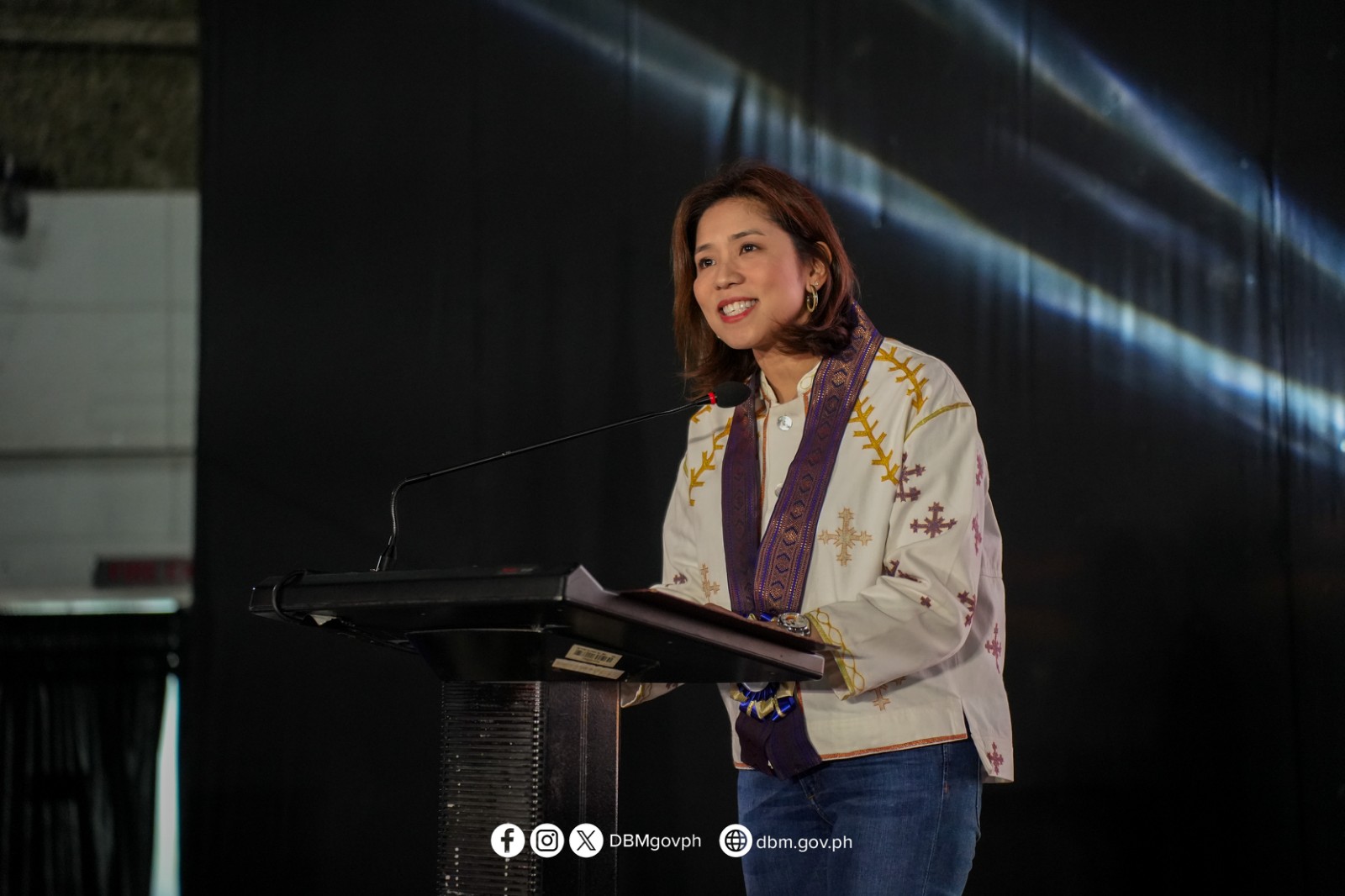
- Details

Isang mapagpalang at pinagpalang araw po sa ating lahat!
Assalamu alaikum wa Raḥmatullahi wa Barakatuh.
First, please allow me to express my sincerest gratitude to everyone who made this purposeful campaign successful through their invaluable support—the Local Government of Quezon City, represented by City Administrator Michael Victor Alimurung; our very own DBM-National Capital Region, Region IV-A, Region IV-B, and Region V, together with our partner agencies, most especially the Department of the Interior and Local Government and the Philippine Information Agency; our partners from the Civil Society Organizations; our fellow public servants; and of course, our dear participants. Truly, this gathering is an embodiment of the essence of open government—ang pagkakaisa ng mga mamamayan upang makilahok tungo sa bukás at mabuting pamamahalang bayan.
Alam po ba ninyo na ang Pilipinas ay isa sa walong bansang nagtatag o founding member ng Open Government Partnership o OGP? At makalipas ang labindalawang taon mula nang sinimulan natin ang OGP, patuloy pa din ang ating pagsusumikap sa pagsulong ng open government o gobyernong walang tinatago.
Mapalad din po tayo dahil ang ating mahal na Pangulo—ang Pangulong Ferdinand Romualdez Marcos Jr.—ay sumusuporta sa ating adbokasiya ng Open Government. Under his supervision and administration, sa kauna-unahang pagkakataon, kahit na noong 2011 pa itinatag sa Pilipinas ang OGP, ay ngayon lamang nagkaroon ng institutionalization ng Open Government.
Nitong Hunyo ay inaprubahan na niya ang Executive Order (EO) No. 31 na nagmamandato o ini-institutionalize ang Philippine Open Government Partnership sa ating gobyerno.
Ibig po sabihin, lahat po ng sangay ng ating gobyerno ay kailangang maging bukas o transparent at isusulong ang pakikilahok ng taumbayan o ang tinatawag na public participation. Through EO 31, the Executive, Legislative, and Judicial branches—despite being independent of each other—are now working closely to synchronize and complement our open government initiatives. We will also integrate open government vertically, and bring PH-OGP to the local level through OGPinas.
Ito po ay itinuturing nating malaking tagumpay, hindi lamang po para sa PH-OGP Steering Committee, kundi para sa sambayanang Pilipino.
When we recently attended the 2023 OGP Global Summit in Tallinn, Estonia, we had the opportunity to personally meet and discuss our OGP efforts and initiatives with the OGP Chief Executive Officer himself, OGP CEO Sanjay Pradhan. Sa pagpupulong pong iyon, pinuri po ng OGP CEO ang Pilipinas sa pagiging trailblazer ng open governance sa Asya at maging sa buong mundo. Sinabi rin po niya na ang open government ay nakaukit na po sa DNA ng bawat Pilipino. I am proud to share that in the latest results of the Open Budget Survey, the Philippines was acknowledged as the leading country in the Southeast Asian Region for Public Participation in the budget process.
Napakarami po nating magagandang inisyatibo at pagsusumikap upang isulong ang bukás na pamamahala sa bansa. Hangad po natin na sa pamamagitan ng OGPinas, mailapit natin ang mga inisyatibong ito upang yakapin at mas lalo pa po nating mapagyaman. Tulad po ng sinabi ko sa Philippine Delegation sa Estonia, the Philippines must be THE example of open government.
So let us work harder and let us work together! Our mission here for OGPinas is to encourage and instill a culture of transparency, accountability, public participation, and overall, open government in the country.
Marahil, kayo po ay kawani ng gobyerno na nagnanais ng bukás at malinis na pamamahala; lider-estudyanteng hangad ang edukasyong bukás para sa lahat; miyembro ng civil society na layuning buksan ang mga pampublikong serbisyo sa mga sektor na kadalasang hindi natin naaabot; o mamamayang may gustong ipahayag sa ating gobyerno.
Anuman po ang dahilan ng inyong pakikilahok sa umagang ito, ang nais po naming ipahayag sa lahat ay may boses at mayroon din pong makikinig. Bawat isa po sa atin ay susi sa bukás na kinabukasan.
So maximize this opportunity. Engage in discussions and take up spaces. Make your voices heard.
Let us be empowered by our vision for an open government and let us empower others through this platform to make the changes we all desire for the betterment of our country—even beyond our Agenda for Prosperity.
Sa pagkakataong ito, makipag-usap, maki-diyalogo, makilahok, at sama-sama nating abutin ang pareho nating mithiin: isang Bagong Pilipinas na may nagniningning na kinabukasan para sa lahat.
Maraming salamat po at mabuhay po tayong lahat.
Wabillahi Tawfiq Wal Hidaya, Wasalamu alaikum wa rahmatullahi wa Barakatuhu.
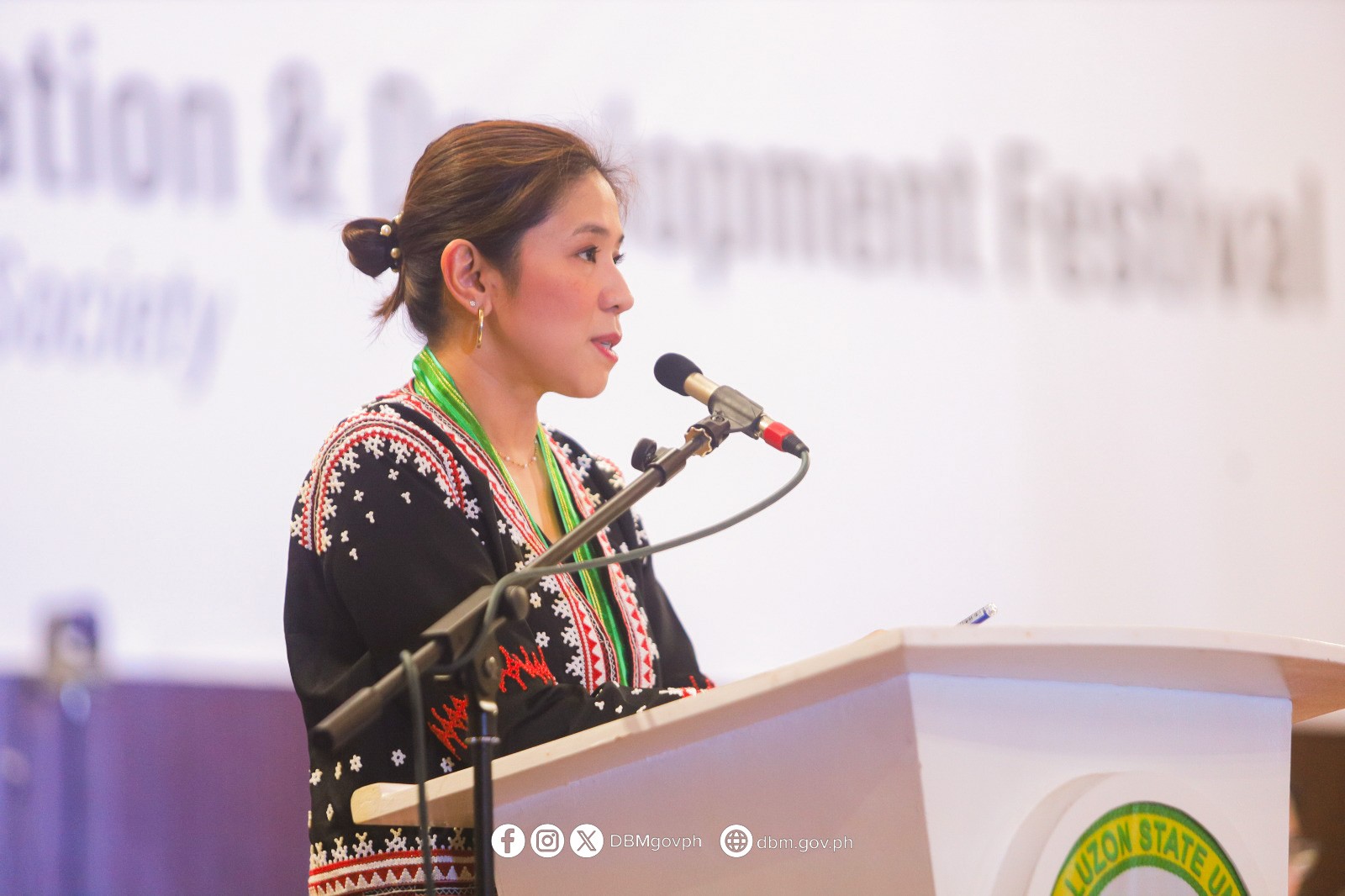
- Details
Central Luzon State University's (CLSU) 2023
Research Innovation and Development (RIDe) Festival
October 9, 2023
CLSU - RET Amphitheater

To the Central Luzon State University (CLSU) Executive Committee headed by no less than your President Dr. Edgar Orden, Science City of Muñoz Mayor Baby Armi Alvarez, our colleagues from other National Government Agencies, professors, senior officers, personnel, and staff of CLSU, and to the bright and promising students of CLSU, magandang umaga po.
Assalamu alaikum wa Raḥmatullahi wa Barakatuh.
First, I thank CLSU for inviting me to deliver this keynote speech in this year’s Research Innovation and Development (RIDe) Festival. Your theme—Research for Development or R4D: Key to a Sustainable Society—resonates with the advocacies that we have been continuously pushing for: innovation and sustainability. And I believe we are in the best place to hold this dialogue as we are in the Science City of Muñoz, the first and only Science City in the Philippines.
The importance of innovation in fueling development and driving economic growth has been recognized globally. According to the OECD or the Organization for Economic Co-operation and Development, the build-up of innovation capacities has played a central role in the growth dynamics of successful developing countries.
A robust innovation ecosystem can help create jobs, increase productivity, and enhance our competitiveness. And, it is for this reason that the present administration is investing heavily in innovation and technology.
Establishing a dynamic innovation ecosystem is at the heart of the socioeconomic transformation agenda of the Philippine Development Plan or PDP 2023 to 2028. The PDP outlines that, over the medium term, the government will provide a nurturing environment for basic research and development or R&D and knowledge creation; support market-driven and customer-centered R&D; scale up technology adoption, utilization, and commercialization; and promote an innovation culture and entrepreneurship.
This RIDe Festival is also timely and relevant. Last September 27, I joined the launch of the National Innovation Agenda and Strategy Document 2023 to 2032 led by no less than our President Ferdinand Romualdez Marcos Jr. In his speech, PBBM reiterated the commitment of the Administration to make innovation an indispensable component of our nation’s development agenda, and a key driver in our vision to achieve a truly smart and innovative Philippines.
Guided by this, we will bolster spending for research and development; support local enterprises; ensure food security through smart agricultural inputs to empower local producers; facilitate efficient and secure financial services; accelerate digitalization efforts to boost manufacturing processes and commercialization of products and services; improve mobility through better urban-rural linkages, and reduce carbon footprints of our transport systems.
And, I am proud to share that this places us on the right track. In the 2023 Global Innovation Index, which was also released last September 27, the Philippines was reported to rank 56th out of 132 economies—climbing three spots—with the country’s innovation inputs improving for the first time since 2020. And given this performance, the country joined a group of middle-income economies such as China, India, Vietnam, and Indonesia that rose the fastest in ranking over the last decade.
The government recognizes that innovation begins with investing in our people, including our youth, and nurturing a conducive environment and culture for innovation. And so we will do this through Filipinnovation, a term coined by our friends from the National Economic and Development Authority (NEDA), Department of Science and Technology (DOST), and Department of Trade and Industry (DTI).
Filipinnovation is the whole-of-government approach to inclusive innovation. Through Filipinnovation, we eliminate silos as government agencies no longer work in isolation, and consequently, the impact of government funding is optimized with a multiplier effect. Seeing the promising research and technologies that you, our dear students, have devised makes me confident that we can further elevate Filipinnovation into a whole-of-nation approach.
On our end at the Department of Budget and Management, we have committed ourselves to ensuring that our national budget—the People’s Budget—will secure a future-proof and sustainable economy toward our Agenda for Prosperity while investing in our people, advancing research and development, and promoting a culture of innovation in our country.
Hence, under the proposed Fiscal Year 2024 National Budget, we allocated a total of Php 25.94 billion to DOST, equivalent to a 4.5 percent increase compared to this year’s budget. This includes Php 8.23 billion for the Grants-in-Aid Program, which covers Php 3.61 billion to support our National S&T Agenda, such as the Science for Change and Small Enterprises Technology Upgrading Programs.
Some Php 1.33 billion will also be provided for the Research and Development initiatives of State Universities and Colleges. And the good news is that we have allocated roughly around Php 50 million for CLSU. Meanwhile, some Php 100 million is allotted for NEDA’s Innovation Fund, which aims to support enterprises engaged in developing innovative solutions that would benefit the country’s underprivileged sectors.
Adapting innovations in the Philippine agriculture sector is likewise crucial for enhancing productivity, resilience, and sustainability, especially since we aim to transform and modernize agriculture into a dynamic and high-growth sector. Thus, Php 1.5 billion will be allotted to the DOST’s National Agriculture, Aquatic, and Natural Resources Sector R&D Program. This will fund facility development, capacity building, and research projects that will supplement the R&D initiatives of the banner programs under the Department of Agriculture.
We will complement this with up-to-date digital infrastructure and technologies. Thus, the proposed budget includes some Php 38.75 billion for digitalization using a whole-of-government approach to digitalization. This increased by 60.6 percent from its Php 24.93 billion budget in 2023.
To propel economic transformation for a prosperous, inclusive, and innovative society, we will also scale up sustainable and green investments with a total amount of Php 543.4 billion for our climate expenditures, equivalent to 9.4 percent of the proposed FY 2024 National Budget. This covers Water Sufficiency projects, followed by Sustainable Energy, Food Security, Knowledge and Capacity Development, Climate Smart Industries and Services, and cross-cutting actions such as technology transfer, research and development, information, education and communication, and capacity building.
As you can see, the Administration is as dedicated and hopeful as you are. As we do our part, I hope you will also pursue the research and technologies that you will showcase at this Festival, because they are all very promising. They have a lot of potential not only in realizing the vision of CLSU to be a world-class National Research University for science and technology in agriculture and allied fields but also in contributing to nation-building.
And before I end, I would like to express my sincerest appreciation to the whole CLSU community for your proactive research on crops, farm resources, agricultural or environmental engineering, and fisheries and livestock, among others. Research propels our humanity forward. Driven by curiosity, we open possibilities, find solutions, and pave the way for progress. Hence, you are also opening possibilities, finding solutions, and paving the way for progress in our agricultural sector—which was paid less attention in the past and given little funding to prosper.
To our dear students, you are blessed and privileged to receive quality education from your beloved university. I hope you will use this privilege to make the most of your education and uplift the lives of our fellow Filipinos who do not enjoy the same. To find ways, through innovation, to make living easier for those who have it difficult in life, and to help our farmers, fisherfolks, agriculturists, agricultural workers, and other members of the informal sector.
Indeed, this is what Bagong Pilipinas is all about—innovation with impact—our key to a sustainable society, even beyond our Agenda for Prosperity.
Thank you very much.
Wabillahi Tawfiq Wal Hidaya, Wasalamu alaikum wa rahmatullahi wa Barakatuhu.

- Details
Hello and good afternoon to our very young participants today— the future leaders of our country—and to our OGP partners for this program!
Assalamu alaikum wa Raḥmatullahi wa Barakatuh.
For the young ones here who are not familiar with me, I am Secretary Amenah F. Pangandaman of the Department of Budget and Management or DBM and I am also simultaneously Chairperson of the Philippine Open Government Partnership or PH-OGP Steering Committee.
First, I would like to thank and congratulate the Council for the Welfare of Children, the United Nations Children’s Fund or UNICEF Philippines, the United Nations Development Programme or UNDP, our CSO partners especially the Positive Youth Development Network and Unang Hakbang Foundation, for making this trailblazing event possible. I would also like to thank the representatives from the Department of Education, Department of Social Welfare and Development, Department of the Interior and Local Government, and the Philippine National Police for joining us today.
This is the first time that we have engaged with adolescents for the Open Government Partnership or OGP. So, dear participants, you are a very special batch. You are the pioneer batch of junior advocates for OGP.
I am sure that you have already been introduced to the concept of Open Government. As you probably know by now, one of the important aspects and values encouraged by OGP is public participation in policy-making. We have already been doing that by consulting with NGOs and Civil Society Organizations or CSOs. But this time, we have taken it a step further by consulting and dialoguing with our adolescent advocates!
So I want to tell our young ones a very important message today: your thoughts matter. More importantly, your thoughts matter to us, your leaders in government. We want to hear you, we want to listen to you, and we want to take into consideration your ideas and perspectives. Because we, the current leaders in government, are not youth anymore. I am from Gen X; you are from Gen Z. We can only put ourselves in your place but only you really, truly know the challenges that you are facing. So I hope that you have been fully participating and speaking up. Like Taylor Swift said, Speak now!
But allow me also to share with you, our youth, what we—your leaders in government—have been doing for you.
On our end at the Department of Budget and Management, we are committed to pursuing the country's economic transformation but with inclusivity and sustainability in mind. That means that we are focused on achieving economic growth but as we craft policies, we also seek to ensure that no one is left behind, especially not the youth nor the children; and that the impact is for all, including the future generations.
Let me share with you some numbers that you might not hear in the news or see on social media. For the development of children and the youth through education, in the Fiscal Year 2024 proposed National Budget, we have allocated Php 924.7 billion to our Education sector. We have also included Php 41 billion for Education Assistance and Subsidies.
Aware of the necessity of being connected virtually today, especially for students, we are also making our country future-ready through digitalization. We are allocating Php 2.5 billion to support Free Internet Wi-Fi Connectivity in Public Places and State Universities and Colleges. On top of this, there is also a proposed allocation of Php 1.5 billion to help improve overall internet speed and affordability. We know how important the internet is today, especially for students!
We are also addressing nutrition, which is very important in early childhood development. Hence, we have allotted Php 4.1 billion for the Supplementary Feeding Program of DSWD and Php 52 million for the Early Childhood Care and Development in the First 1000 Days Program.
These are just some of the initiatives of government to ensure the growth and development of the next generations.
But we want to know from the youth yourselves what we might be missing or how we can further improve our service to the nation. So as OGP Chair, I encourage you all, through this event, to use this venue as a platform to air your concerns, ideas, and observations on various issues.
To our partners today, especially UNICEF and UNDP, thank you for supporting this milestone dialogue.
Our children and our youth include some of the most determined, creative, and inspiring members of our society. They are teeming with so much potential; they are our students, athletes, advocates, volunteers, speakers, storytellers, planners, and frontliners.
Hence, we recognize that it is incumbent upon us to provide them with accessible and safe spaces not only to ensure but to encourage their meaningful participation and inclusion in the governance of our nation—as the title of this event suggests, “para sa bata, kasama ang bata.”
We want our children and youth to be empowered. Kaya’t pagsumikapan natin na ang kabataang Pilipino ay maging kabahagi at katuwang ng gobyerno sa paghubog ng isang lipunang hindi lamang makatao kundi makabata.
A study conducted by the Organisation for Economic Co-operation and Development concluded, “The well-being of society is most improved when investments are made in children.” Hence, on our part, we will continue investing in our children and our youth.
To our participants today: speak now! So that in the true spirit of OGP, we can improve government together. Please take advantage of this opportunity to bring fresh insight to our discussions, push for innovations, and most importantly, through the OGP platform, make the voice of your generation heard. After all, as Kailash Satyarthi, a children’s activist and Nobel Peace Prize winner, once said: "No segment in society can match the power, idealism, enthusiasm, and courage of young people."
The economic team is now working hard to improve our economy so that we will have upper-middle-income status soon—that means a brighter future for all, especially the next generations. We call our action plan the Agenda for Prosperity. I hope that you, our participants today, and our partner NGOs and CSOs, will also become our partners in prosperity. Together, let us make our country a better nation for Gen Z and future generations.
Maraming salamat po. Wabillahi Tawfiq Wal Hidaya, Wasalamu alaikum wa rahmatullahi wa Barakatuhu.
